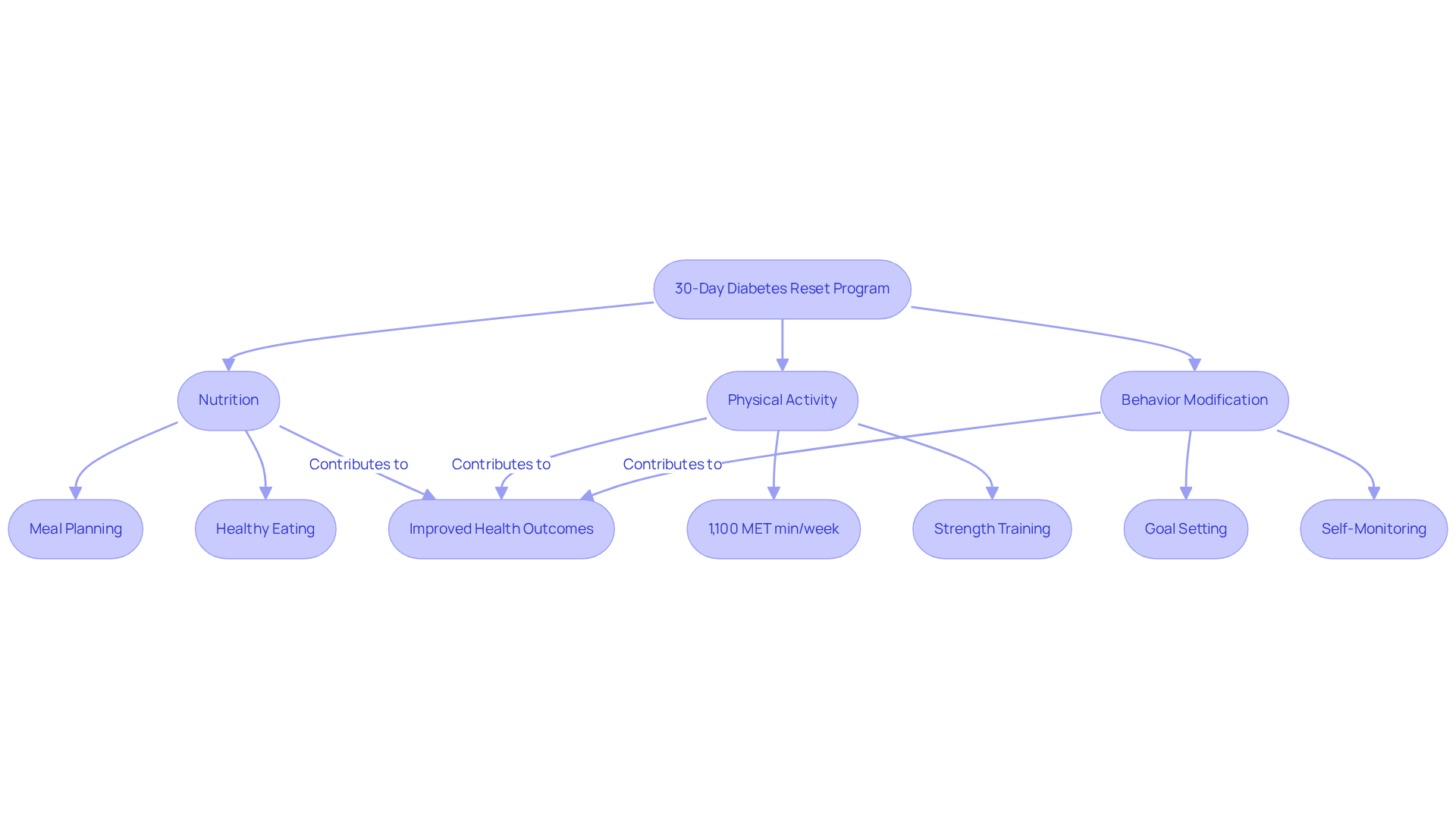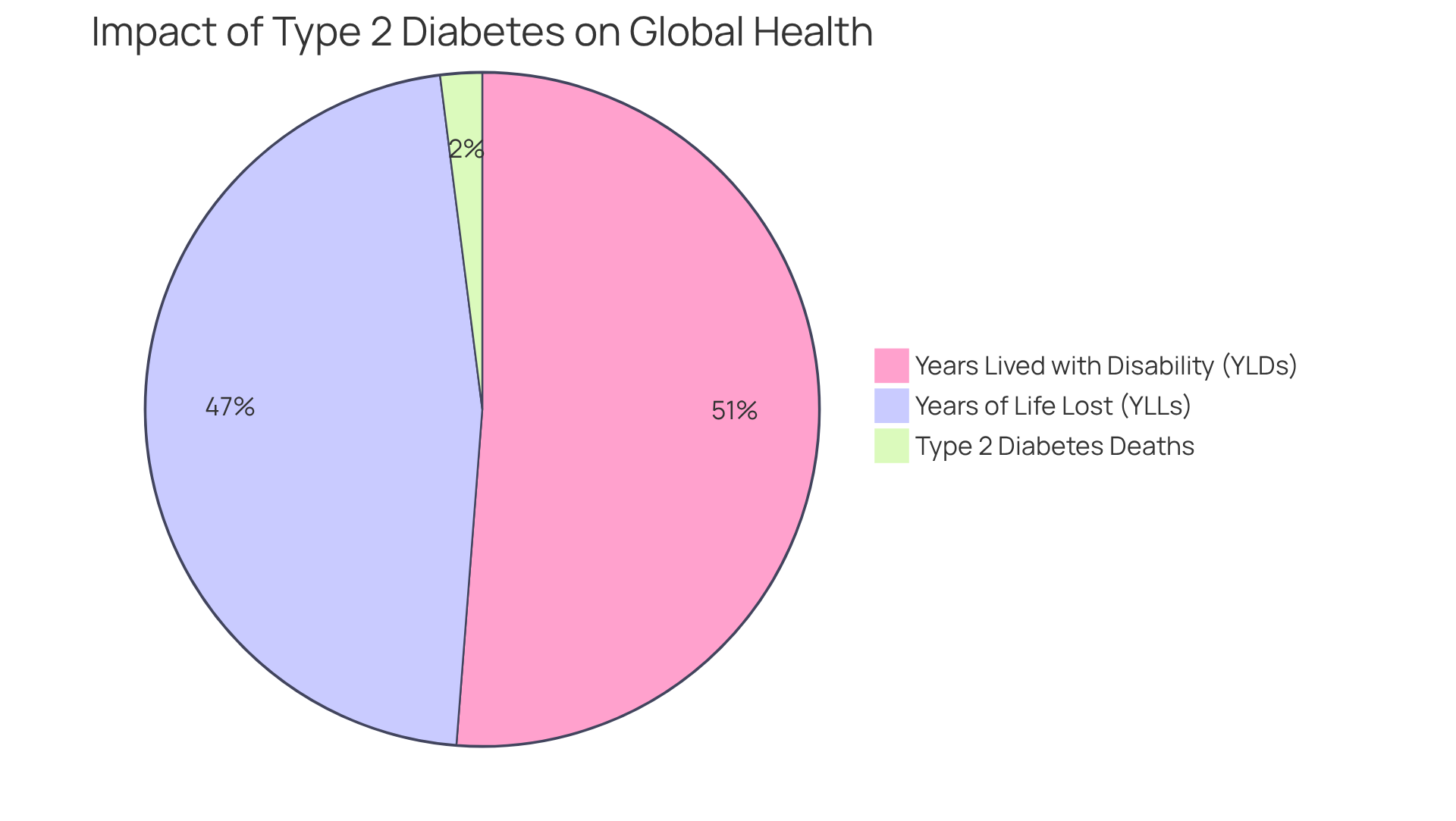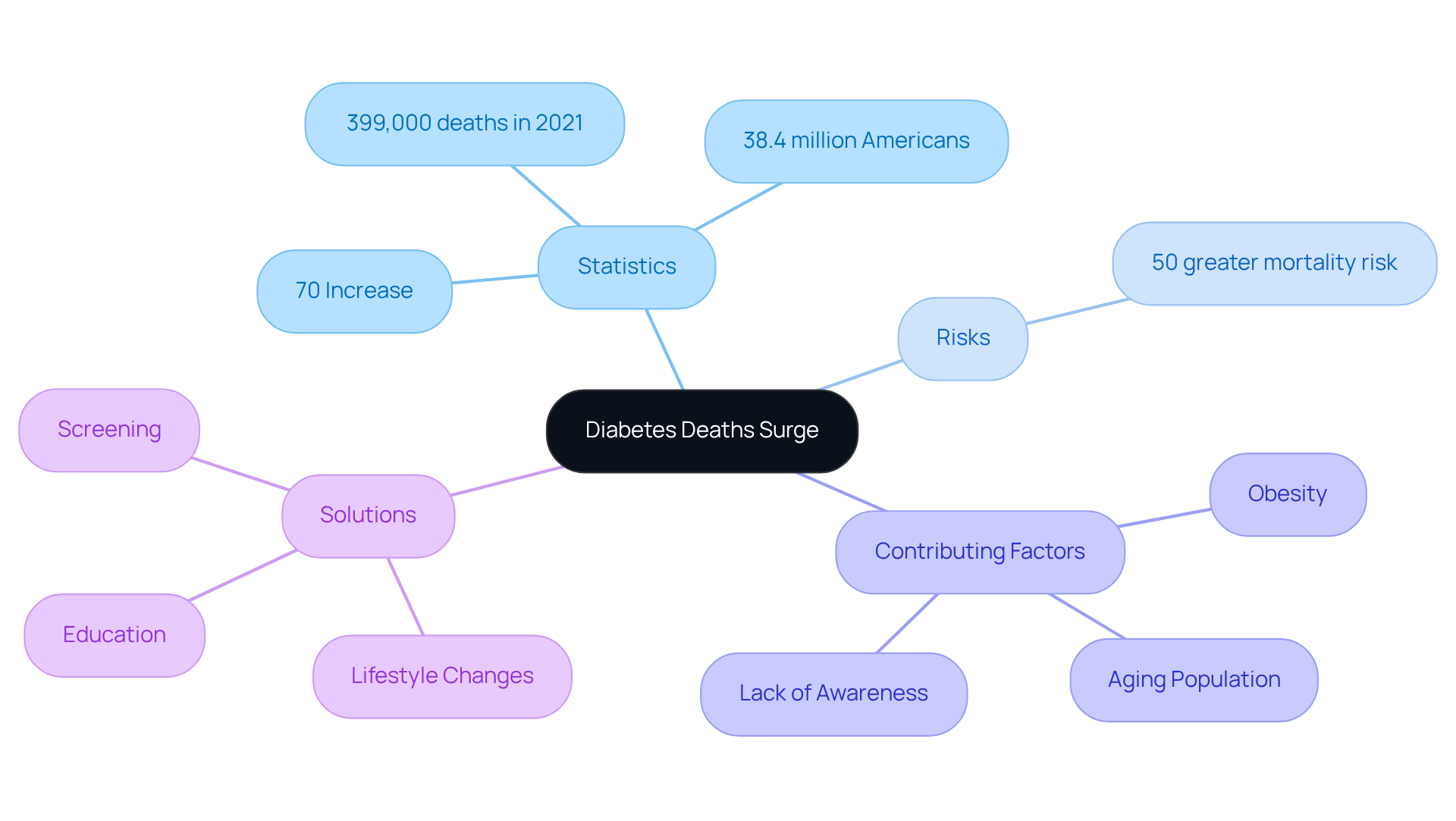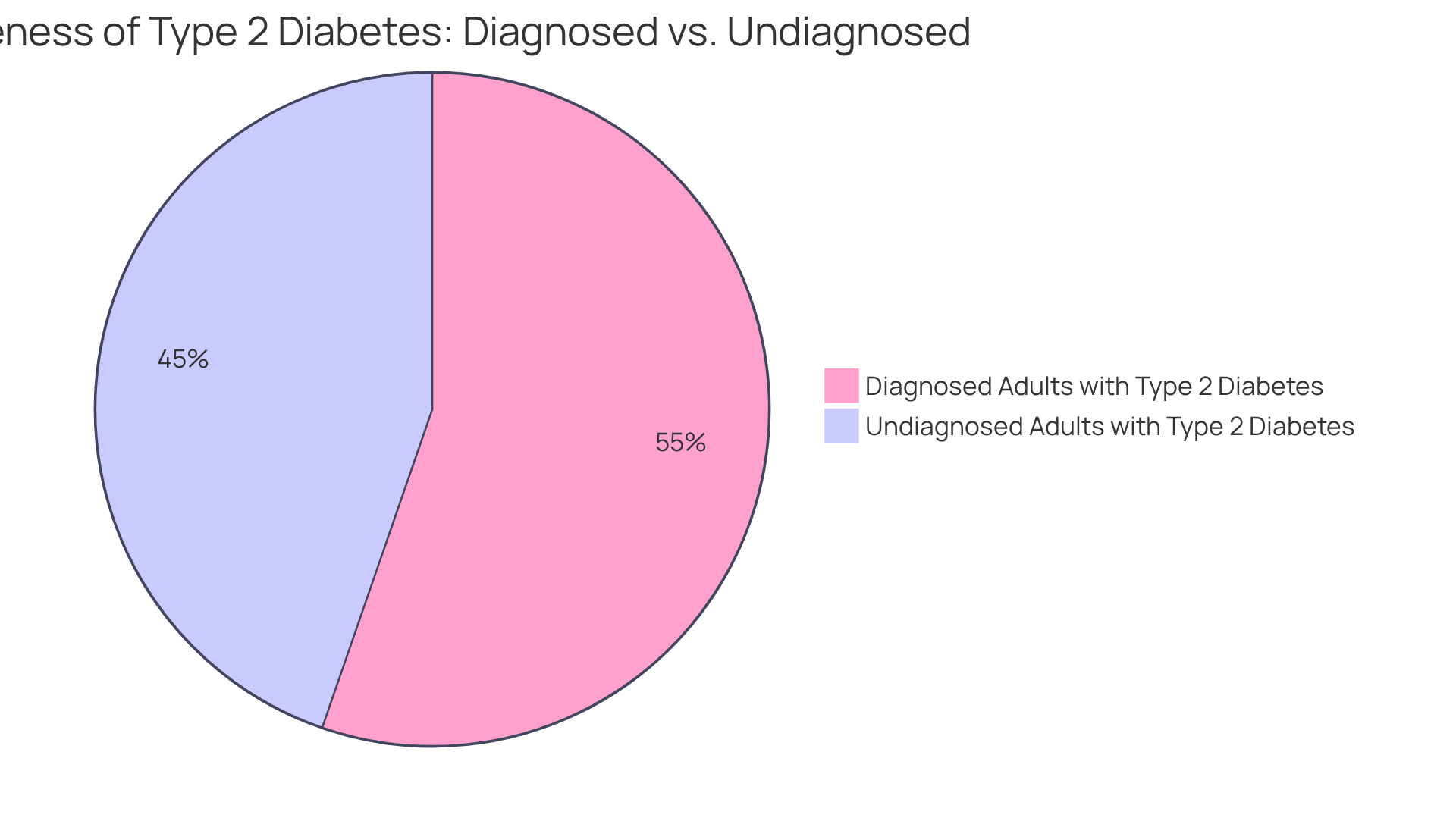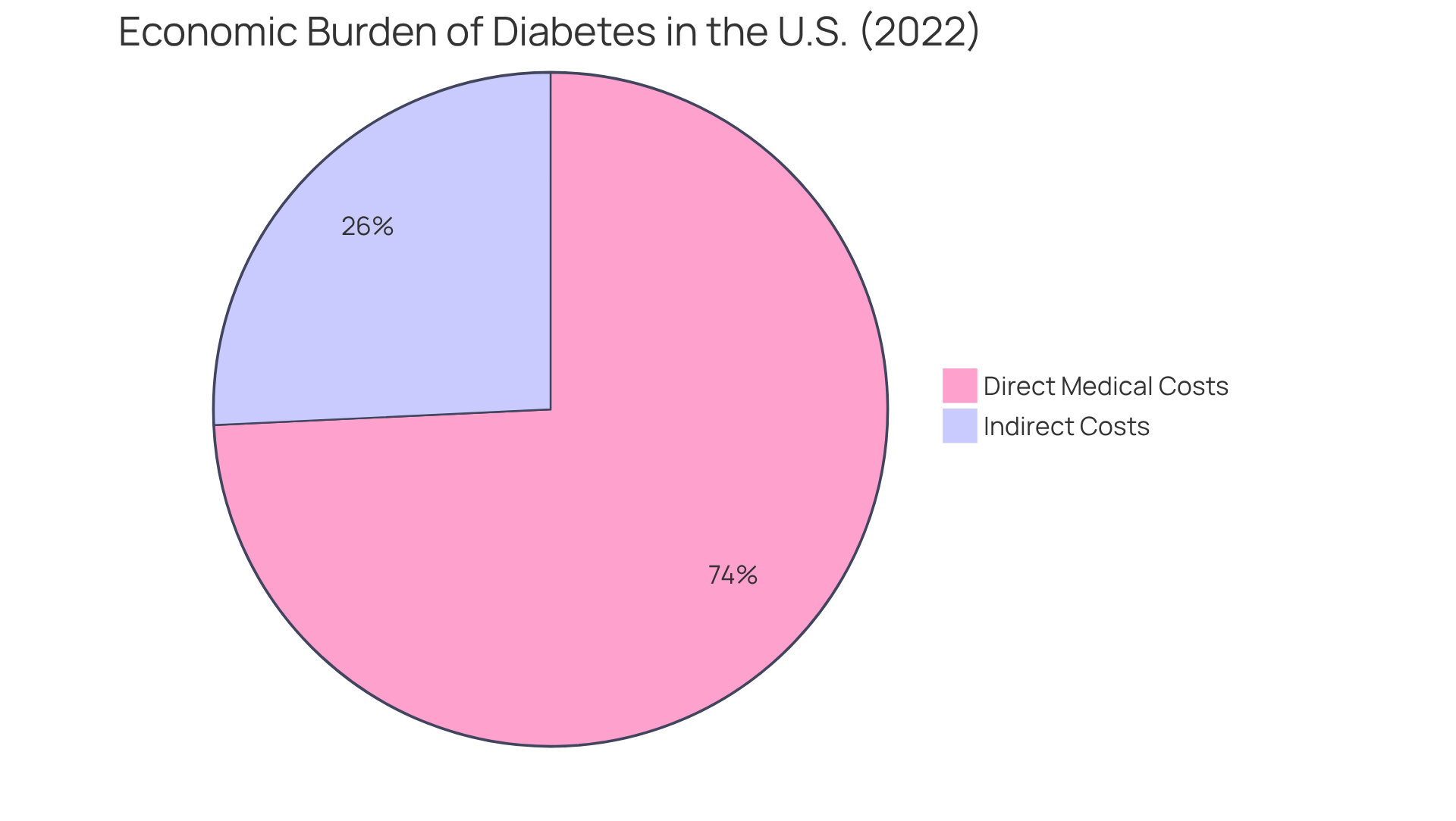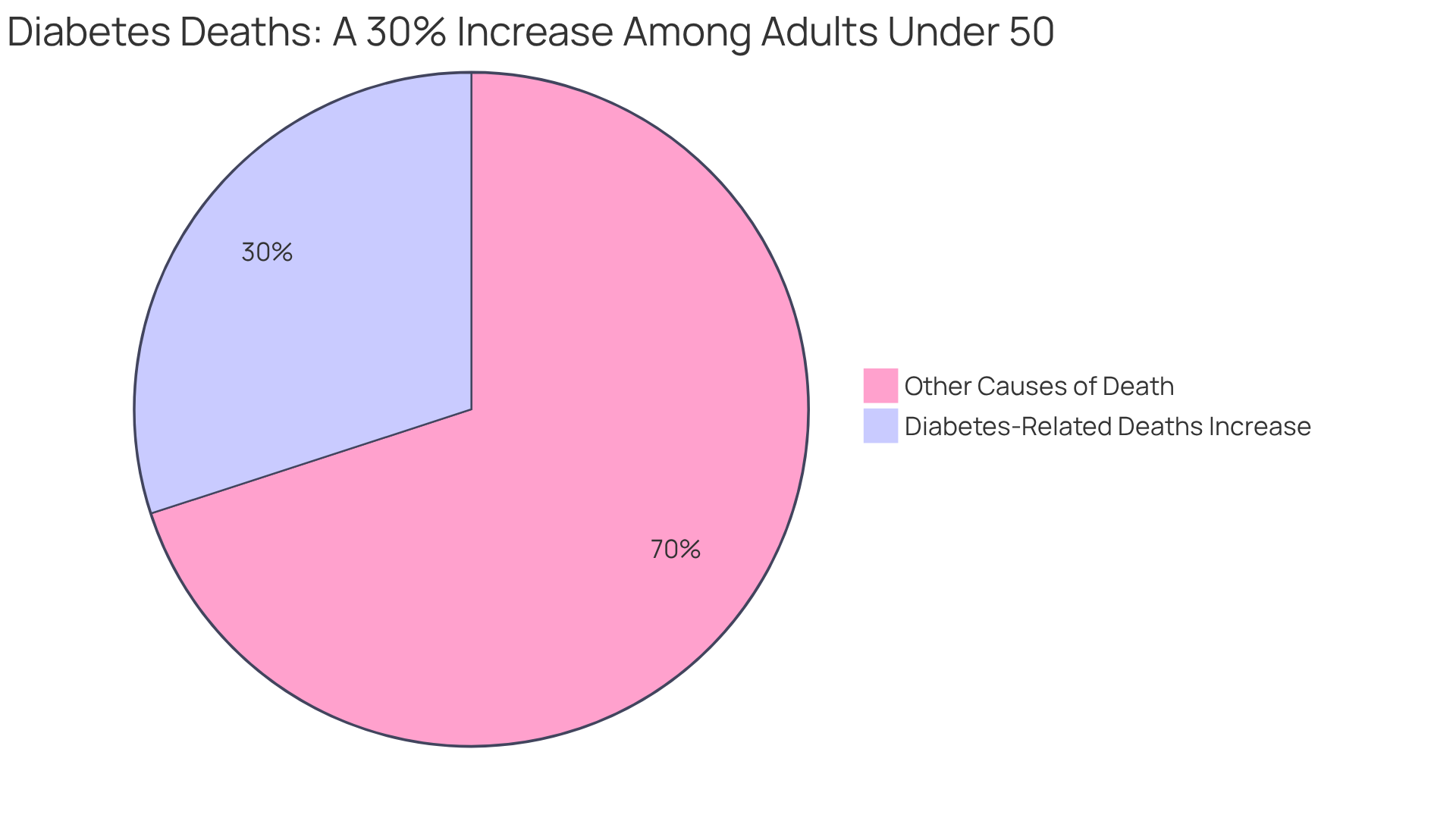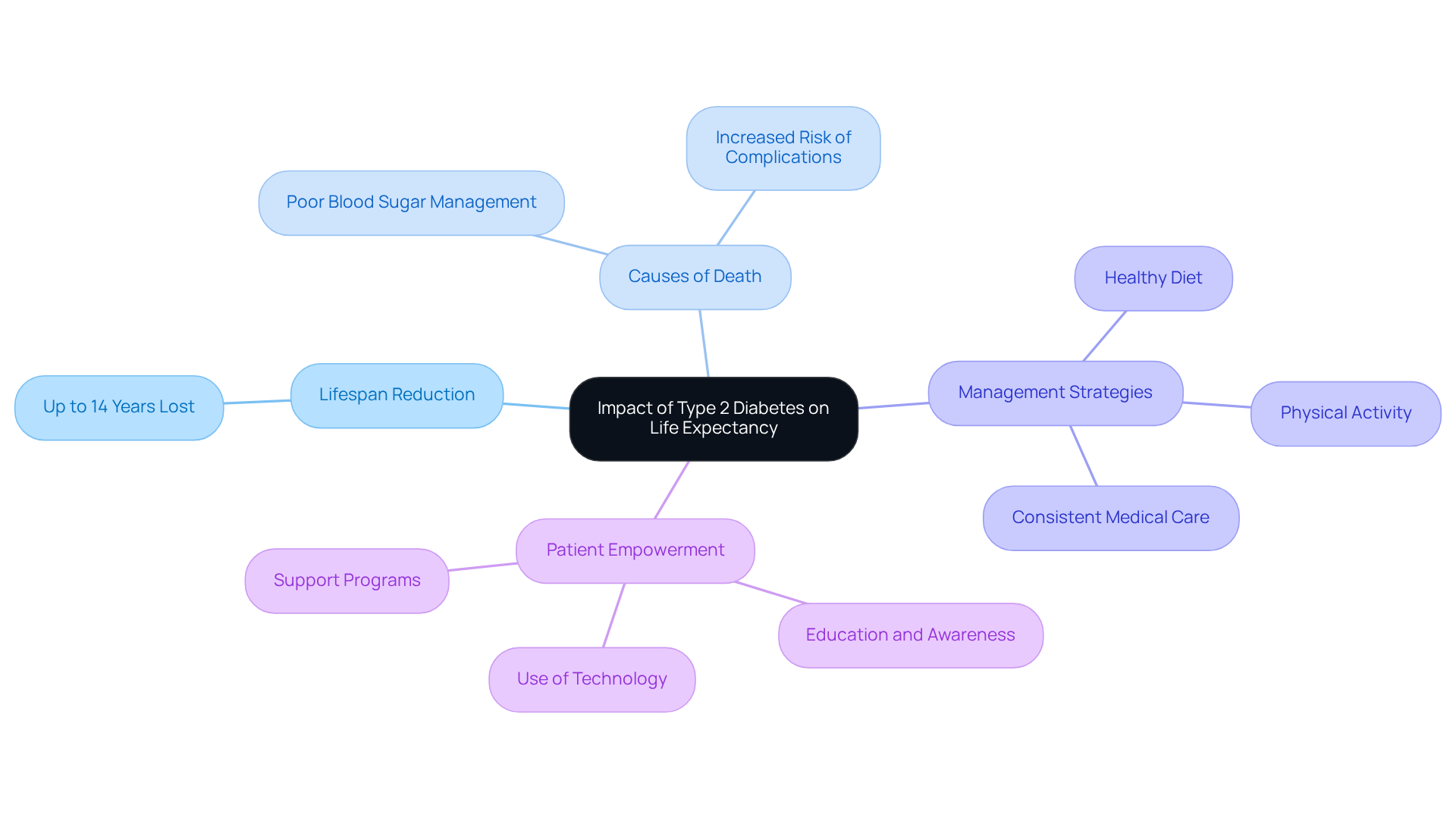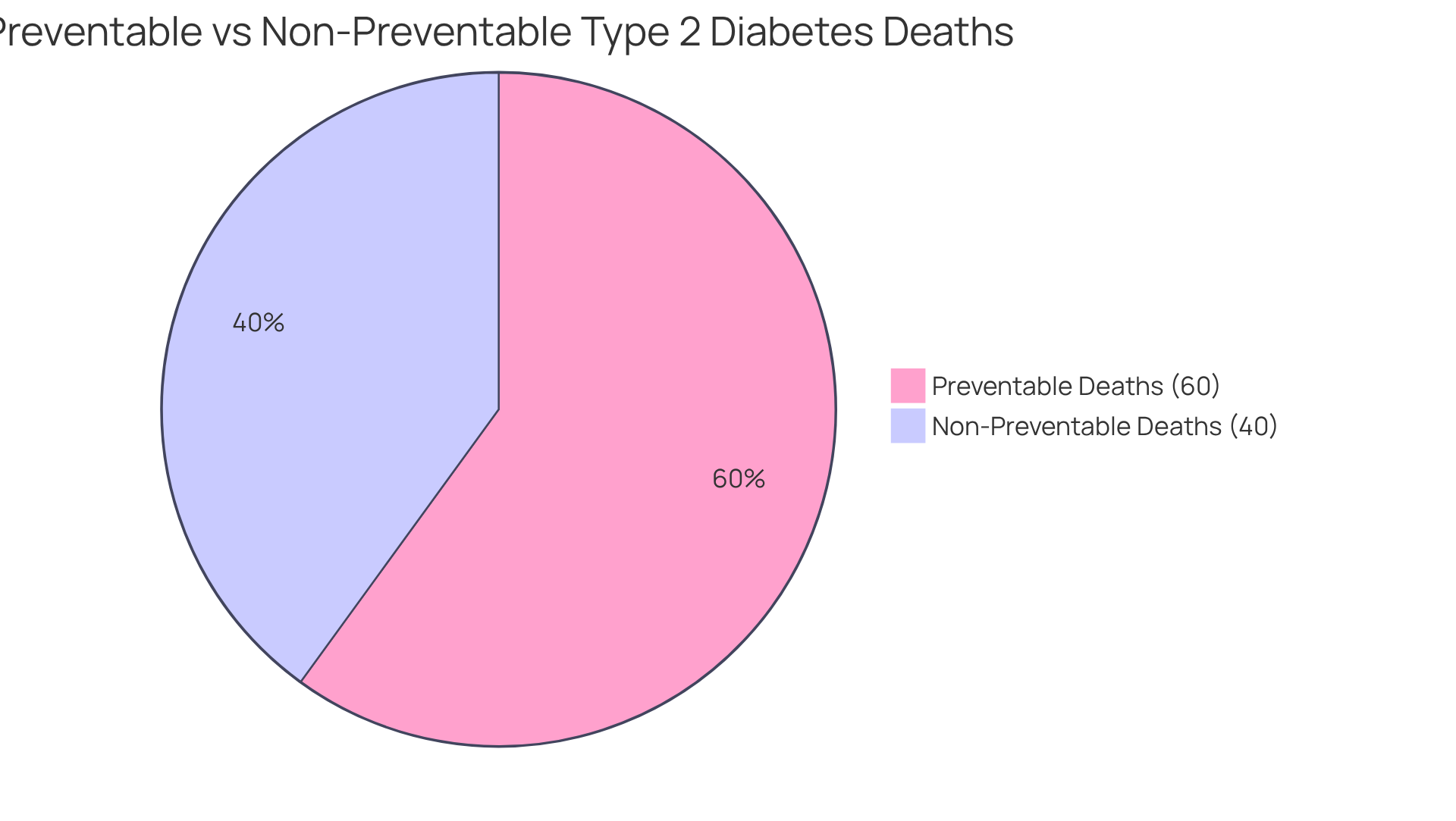Overview
Type 2 diabetes is a significant concern, resulting in over 1.6 million deaths each year worldwide. This alarming statistic highlights an urgent public health crisis that calls for effective management and prevention strategies. It’s important to recognize that many individuals face daily struggles with this condition.
The article emphasizes the critical need for early diagnosis and lifestyle changes, as well as education to combat the rising mortality rates associated with diabetes. Many patients find that making small adjustments to their daily routines can lead to significant improvements in their health.
Moreover, we must consider the economic burden this condition imposes on society. By fostering understanding and support, we can work together to create a healthier future for everyone affected by diabetes. Let’s take action toward a healthier lifestyle, starting with the 30-Day Diabetes Reset program.
Introduction
Type 2 diabetes is not merely a personal health issue; it signifies a staggering global crisis, claiming over 1.6 million lives each year. It’s important to recognize that as the prevalence of this condition continues to rise, understanding the alarming statistics surrounding diabetes-related deaths becomes crucial for both individuals and healthcare providers.
What factors contribute to this growing mortality rate? Many patients find that education and proactive management strategies can play a pivotal role in reversing these trends. This exploration delves into the critical realities of type 2 diabetes deaths, offering insights that could empower individuals to take control of their health and potentially save lives.
Integrative Wellness Center: 30-Day Diabetes Reset Program Reduces Risk of Complications
Are you feeling overwhelmed by the challenges of managing diabetes? The 30-Day Diabetes Reset Program at Dr. Jason Shumard’s Integrative Wellness Center is here to offer you essential tools and knowledge to regain control over your health. This program emphasizes nutrition, physical activity, and behavior modification, significantly reducing the risk of complications associated with type 2 diabetes.
Many patients find that by adopting sustainable practices, they can enhance their long-term wellness. This program is not just a treatment; it’s an essential asset for those eager to take charge of their condition. Case studies show that participants experience notable reductions in HbA1c levels, with some achieving a decrease of up to 1.02%. This underscores the program’s effectiveness in fostering a healthier lifestyle.
It’s important to recognize that integrating physical activity—an optimal dose identified as 1,100 MET min/week—can enhance glycemic control and overall health outcomes. This comprehensive approach not only addresses the symptoms of diabetes but also encourages a healthier lifestyle, leading to improved quality of life and reduced dependence on traditional medical treatments.
Transformative patient testimonials highlight the success of the program. Individuals report significant weight loss, improved energy levels, and a reduction in medication needs. As medical professional John Landry beautifully states, “Diabetes may bring its share of challenges, but it also presents an opportunity to grow in strength, discipline, and self-care.”
If you’re ready to explore how Dr. Shumard’s expertise in functional medicine can support your journey, reach out to the Integrative Wellness Center today. You can also sign up for our upcoming event to begin your path toward improved well-being!
Over 1.5 Million Deaths: Annual Global Toll of Type 2 Diabetes
Type 2 metabolic disorder results in over 1.6 million type 2 diabetes deaths per year worldwide, underscoring the urgent need for effective management and prevention strategies. This staggering statistic points to a significant public health challenge, especially as the global prevalence of this condition continues to grow. In 2021 alone, type 2 diabetes deaths per year accounted for an estimated 1.62 million fatalities, with projections indicating that by 2050, more than 1.31 billion people could be living with this condition. It’s important to recognize that understanding the factors contributing to these deaths is vital for both individuals and healthcare providers. This knowledge emphasizes the importance of early diagnosis, lifestyle changes, and comprehensive treatment plans.
Many patients find that type 2 diabetes accounts for 94% of diabetes-related years of life lost (YLLs) and 96.6% of years lived with disability (YLDs). This highlights the necessity for targeted public strategies to combat this growing epidemic. As the burden of diabetes-related mortality continues to rise, we must prioritize education and empowerment for patients. By doing so, we can help them take control of their health and reduce their risk of complications. Remember, you are not alone in this journey, and there are resources available to support you every step of the way.
Diabetes Deaths Surge: 70% Increase in the Last 10 Years
Over the past decade, type 2 diabetes deaths per year have surged by a staggering 70%, underscoring a critical public health crisis. This increase reflects the growing occurrence of the condition, which now impacts approximately 38.4 million Americans, with projections suggesting that this figure could surpass 54.9 million by 2030. It’s important to recognize that adults with this condition face a 50% greater risk of mortality from any cause compared to those who do not have it.
Many patients find that although the occurrence of fatalities directly linked to the condition has displayed some reduction, the total mortality rates related to the illness keep increasing. In 2021 alone, there were over 399,000 type 2 diabetes deaths per year cited as a reason for mortality in the U.S., making it the eighth leading cause of mortality. Furthermore, the annual increase in type 2 diabetes deaths per year is expected to rise by 38% by 2030, reaching approximately 385,800.
Healthcare leaders emphasize the need for aggressive public health measures to combat this epidemic. Effective lifestyle changes can lower the likelihood of developing type 2 conditions by up to 58% in at-risk groups. However, only a small percentage of people with prediabetes are aware of their condition. This lack of awareness, along with increasing obesity rates and an aging population, contributes to the concerning trend in type 2 diabetes deaths per year.
In San Marcos, CA, adopting a holistic lifestyle that incorporates a balanced diet abundant in local produce, regular outdoor exercise, and community support can enable people to control their condition effectively. Transformative patient experiences, like those shared by individuals who have effectively managed their condition with personalized guidance from Dr. Jason Shumard at the Integrative Wellness Center, emphasize the potential for positive outcomes. For instance, patients have reported significant weight loss and improved blood sugar levels through tailored lifestyle changes.
As we progress, it is essential to improve screening, education, and support initiatives to manage the condition effectively and lower its related mortality rates. By concentrating on comprehensive healthcare solutions and enabling patients through education and functional medicine, we can strive to reverse the concerning trends in mortality associated with blood sugar disorders. For personalized guidance and support tailored to your unique needs, consider reaching out to Dr. Shumard today.
Disparities in Mortality: 50% Higher Death Rates Among African Americans
Research indicates that African Americans face a staggering 50% higher mortality rate from this disease compared to their white counterparts. This considerable gap highlights the pressing requirement for culturally aware healthcare solutions tailored to the unique challenges faced by diverse communities in managing their health. It’s important to recognize that public welfare authorities stress the need to tackle these inequalities through focused educational programs. These programs empower individuals with the knowledge and tools essential for effectively managing their condition.
Many patients find that culturally sensitive care for those with blood sugar issues can lead to improved wellness outcomes and increased patient engagement. For instance, case studies demonstrate the positive impact of such care. Statistics indicate that in 2021, type 2 diabetes deaths per year ranked as the eighth leading cause of mortality in the U.S., with African Americans disproportionately affected. This underscores the necessity for a unified effort to implement healthcare strategies that address not only the medical aspects of the condition but also the social factors contributing to the concerning rates of type 2 diabetes deaths per year.
In moving forward, let’s advocate for compassionate healthcare solutions that resonate with the experiences of those affected. Together, we can foster an environment where everyone has the opportunity to thrive and manage their health effectively.
Obesity Link: 80% of Type 2 Diabetes Deaths Associated with Excess Weight
A staggering 80% of type 2 diabetes deaths per year are linked to excess weight, highlighting the critical role obesity plays in this health crisis. It’s important to recognize that nearly 40% of Americans aged 20 and older face challenges with glucose regulation or prediabetes, with obesity being a significant contributing factor. Effective weight management can significantly reduce the risk of complications related to this condition, including cardiovascular issues, which represent a considerable share of type 2 diabetes deaths per year.
Many patients find that effective weight management initiatives, like Dr. Jason Shumard’s Functional Medicine Approach at Integrative Wellness Center, can be transformative. These initiatives illustrate how lifestyle modifications can lead to better wellness outcomes. Patients often share their empowering experiences, highlighting how education and actionable insights provided by Dr. Shumard help them manage their well-being more effectively.
Nutritionists emphasize that each meal presents an opportunity to make healthier choices. This reinforces the idea that sustainable changes in diet and exercise can lead to significant long-term benefits. However, specialists caution that relying solely on motivation is not enough for lasting well-being advancements; discipline and self-care are essential for maintaining a healthy weight.
To effectively monitor progress, individuals are encouraged to set SMART goals—specific, measurable, attainable, relevant, and time-bound. Regularly reviewing one’s progress fosters accountability and allows for the adaptation of goals in response to changing fitness levels. As the World Health Organization continues to track advancements in reducing non-communicable diseases, it becomes clear that addressing obesity is crucial for combating the blood sugar crisis and enhancing overall community well-being. Dr. Shumard’s comprehensive method enables patients to take charge of their health, making strides toward reversing type 2 conditions and improving overall wellness. If you’re ready to regain your well-being, call 858-564-7081 to learn how Dr. Shumard can assist you.
Silent Epidemic: 1 in 4 Adults with Type 2 Diabetes Remain Undiagnosed
Did you know that around 44.7% of adults living with type 2 conditions are unaware of their situation? This contributes to what many refer to as a silent epidemic, which poses significant risks to overall well-being. It’s important to recognize that this lack of awareness can lead to serious complications, such as cardiovascular disease and microvascular issues. Elevated insulin levels, often linked to various chronic medical problems, can exacerbate these risks.
In 2021, approximately 239.7 million people worldwide were unaware of their condition. This highlights an urgent need for improved screening programs and public wellness initiatives. The prevalence of undiagnosed blood sugar issues is particularly concerning among racial and ethnic minorities, with rates soaring as high as 61% in some groups. Many patients find that regular health screenings are essential for early detection and management, as individuals may spend 5 to 6 years in an asymptomatic phase before receiving a diagnosis.
Healthcare professionals emphasize, “Proactive screening can significantly lower the burden of undiagnosed conditions, ultimately enhancing patient outcomes and quality of life.” With the global prevalence of diabetes projected to rise to 783 million by 2045, addressing this silent epidemic through education and awareness is more critical than ever.
We encourage you to take action by contacting the Integrative Wellness Center to schedule regular screenings. Attend educational seminars offered by Dr. Shumard, where you can receive personalized guidance and learn holistic lifestyle strategies to manage your health effectively. Remember, you are not alone on this journey; support is available to help you thrive.
$327 Billion: Annual Cost of Diabetes-Related Deaths in the U.S.
The annual cost of diabetes-related deaths in the United States is staggering, estimated at $412.9 billion. This figure reflects not only direct healthcare expenses but also the profound economic impact of lost productivity. It’s important to recognize that around $306.6 billion is attributed to direct medical costs, while $106.3 billion stems from indirect costs, such as reduced workforce participation and premature mortality. Many patients find this reality overwhelming, underscoring the urgent need for effective management and preventive strategies.
By focusing on early intervention and education, healthcare systems can truly alleviate this financial burden. Imagine a future where individuals feel empowered to take control of their health. This shift in focus can benefit not only those living with diabetes but also society at large. Together, we can create a supportive environment that encourages healthier living and fosters hope for a brighter tomorrow.
Rising Concern: 30% Increase in Diabetes Deaths Among Adults Under 50
Recent statistics reveal a concerning 30% increase in diabetes-related fatalities among adults under 50. This shift highlights the significant impact of this chronic condition on a vulnerable demographic. In 2021, type 2 diabetes deaths per year in the U.S. reached 103,294, making it the eighth leading cause of death. This underscores the urgency of addressing this issue. Health advocates, including Dr. Phil McGraw, stress the importance of early intervention and proactive education on healthy lifestyle choices to reduce the risk of developing blood sugar issues.
It’s important to recognize that traditional therapies often focus on managing symptoms rather than addressing the underlying causes of type 2 diabetes. Many patients find that they are prescribed insulin and medications that can inadvertently worsen insulin resistance. This can lead to a cycle of dependency, leaving them without true healing. Dr. Jason Shumard promotes a functional medicine approach that empowers patients through education and comprehensive care, striving to reverse type 2 diabetes by tackling its root causes.
Adopting preventive measures, such as maintaining a balanced diet and engaging in regular physical activity, is crucial for younger populations. Moreover, the financial burdens linked to this illness totaled $412.9 billion in 2022. This figure demonstrates the wider consequences of this condition beyond personal well-being. As the number of type 2 diabetes deaths per year increases, it is essential to concentrate on effective methods that enable individuals to take control of their health and prevent the onset of this illness.
Are you ready to make a change? Together, we can work towards a healthier future.
Life Expectancy Impact: Type 2 Diabetes Can Shorten Lifespan by Up to 14 Years
Living with Type 2 diabetes can be incredibly challenging, particularly when considering the type 2 diabetes deaths per year and the impact it can have on a person’s lifespan. Research suggests that the impact of type 2 diabetes deaths per year may lead to a reduction of up to 14 years for individuals, highlighting the need for effective management and prevention strategies. Many patients find that when blood sugar levels are not well-managed, the risk of complications increases, potentially contributing to type 2 diabetes deaths per year.
However, there is hope. By adopting healthier lifestyles—such as improving diet, engaging in regular physical activity, and maintaining consistent medical care—individuals can significantly enhance their quality of life and longevity. It’s inspiring to hear from patients who actively participate in management programs; they often report improved health outcomes and a newfound sense of empowerment in controlling their condition.
This proactive approach is crucial. It not only helps reduce the risks associated with health issues but also fosters a greater sense of overall well-being. Remember, you are not alone on this journey. Together, we can work towards a healthier future, one step at a time.
Awareness Matters: 60% of Diabetes Deaths Could Be Prevented with Education
Research indicates that targeted education and awareness initiatives could prevent as many as 60% of type 2 diabetes deaths per year. This statistic highlights the crucial significance of knowledge in effectively managing the condition. It’s important to recognize that by providing individuals with vital information regarding their well-being, we can greatly reduce the occurrence of diabetes and its related complications. Many patients find that effective awareness initiatives for managing blood sugar levels lead to better wellness outcomes. Knowledgeable patients are more inclined to participate in preventive actions, which can significantly enhance their quality of life.
For instance, community-driven initiatives that promote understanding of diabetes management have shown promising results in reducing the type 2 diabetes deaths per year. Statements from wellness educators stress that ‘Diabetes is a journey, but you don’t have to walk it alone.’ This reinforces the idea that collective awareness and support can lead to significant improvements in health. We’re in this together, and fostering a culture of education around diabetes is not just beneficial; it is essential for preventing unnecessary type 2 diabetes deaths per year and improving the quality of life for those affected. Let’s take this journey together, supporting one another every step of the way.
Conclusion
The alarming statistics surrounding type 2 diabetes deaths highlight a pressing public health crisis that truly demands our immediate attention. With over 1.6 million lives lost each year globally and an increasing trend in mortality rates, it becomes clear that effective management and prevention strategies are essential. It’s important to recognize that the insights presented in this article reveal the multifaceted nature of this health challenge, emphasizing the roles of obesity, undiagnosed cases, and health disparities that disproportionately affect certain communities.
Many patients find that a significant portion of type 2 diabetes deaths could be prevented through education and awareness. The rise in mortality rates, particularly among younger adults and marginalized populations, calls for a comprehensive approach that includes lifestyle changes, proactive screening, and culturally sensitive healthcare initiatives. Moreover, the financial burden of diabetes-related deaths further illustrates the need for a shift towards preventive measures that empower individuals to take control of their health.
In light of these findings, it is imperative to advocate for increased awareness and education surrounding diabetes management. By fostering a culture of knowledge and support, communities can significantly reduce the incidence of preventable deaths and improve overall quality of life for those affected. The journey toward effective diabetes management is one that we can undertake collectively, ensuring that everyone has the opportunity to thrive and live healthier lives.
Frequently Asked Questions
What is the 30-Day Diabetes Reset Program at the Integrative Wellness Center?
The 30-Day Diabetes Reset Program is designed to help individuals manage diabetes by providing essential tools and knowledge focusing on nutrition, physical activity, and behavior modification to reduce the risk of complications associated with type 2 diabetes.
What results have participants experienced in the 30-Day Diabetes Reset Program?
Participants in the program have reported notable reductions in HbA1c levels, with some achieving decreases of up to 1.02%. Many also experience significant weight loss, improved energy levels, and a reduction in medication needs.
How does physical activity contribute to diabetes management in the program?
The program emphasizes integrating physical activity, with an optimal dose identified as 1,100 MET min/week, which can enhance glycemic control and overall health outcomes.
What are the global statistics related to type 2 diabetes deaths?
Type 2 diabetes results in over 1.6 million deaths per year worldwide. By 2050, it is projected that more than 1.31 billion people could be living with this condition.
What has been the trend in type 2 diabetes deaths over the past decade?
Type 2 diabetes deaths have surged by 70% over the past decade, with over 399,000 deaths attributed to the condition in the U.S. in 2021, making it the eighth leading cause of mortality.
What factors contribute to the rising mortality rates associated with type 2 diabetes?
Factors include increasing obesity rates, an aging population, and a lack of awareness among individuals with prediabetes. Aggressive public health measures and lifestyle changes are necessary to combat these trends.
How can individuals effectively manage their diabetes?
Individuals can manage their diabetes through a holistic lifestyle that includes a balanced diet, regular outdoor exercise, and community support, as well as personalized guidance from healthcare professionals.
What is the importance of early diagnosis and lifestyle changes in diabetes management?
Early diagnosis and lifestyle changes are vital for reducing the risk of complications and improving health outcomes for individuals with type 2 diabetes. Education and empowerment are key to helping patients take control of their health.
